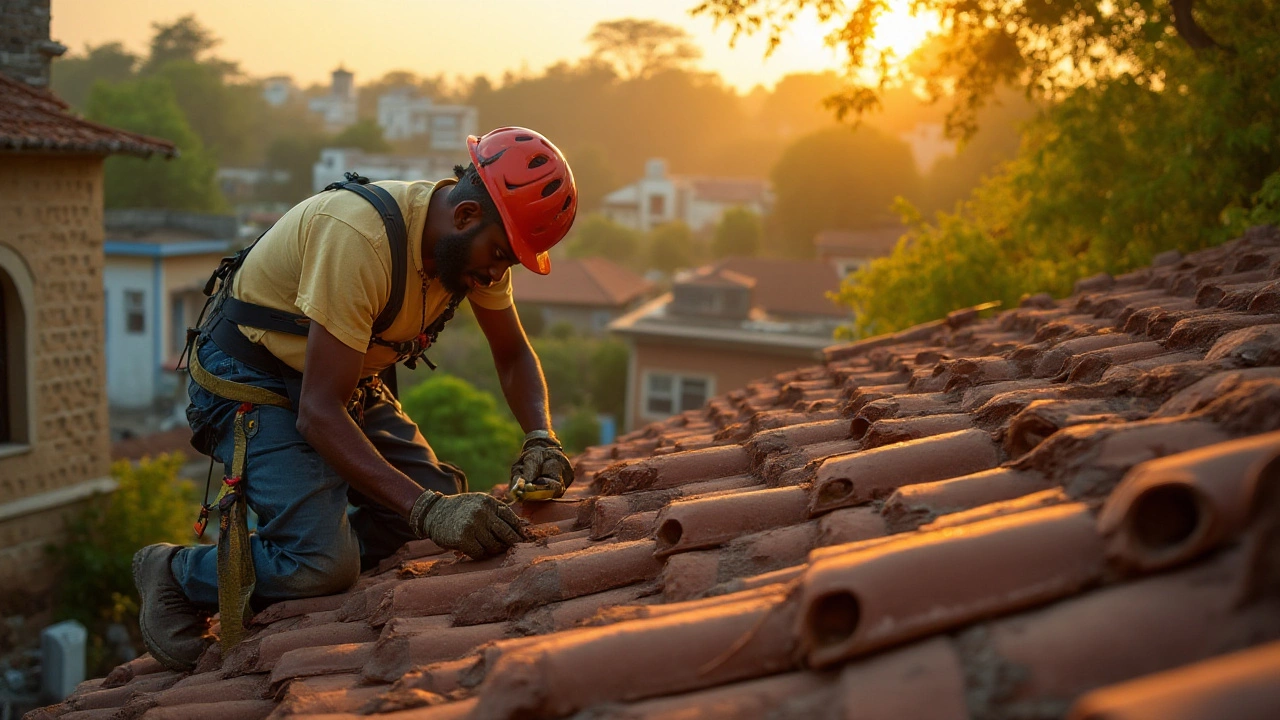Understanding Roofing Services: A Comprehensive Guide

Roofing services play a critical role in maintaining the safety and appeal of homes and buildings. With the roof being the first line of defense against the elements, understanding the scope of these services is essential for any property owner.
From minor repairs to complete overhauls, roofing services cover a wide array of needs that ensure your roof remains in top condition. These services include inspections, maintenance, repairs, and installations, each tailored to address specific issues or improvements.
Additionally, the choice of materials and the expertise of the roofing contractor can significantly impact the longevity and appearance of a roof. By exploring the fundamentals of roofing services, property owners can make informed decisions that align with their preferences and requirements.
- Defining Roofing Services
- Types of Roofing Services
- Choosing the Right Roofing Contractor
- Common Roofing Materials and Their Benefits
Defining Roofing Services
Roofing services consist of a broad spectrum of tasks aimed at safeguarding the shelter overhead that we often take for granted. At its core, these services can be defined by their mission to protect and enhance the functionality and aesthetic qualities of a building's roof. From straightforward repairs to complex installations, these tasks ensure that our roofs can withstand nature’s elements like rain, wind, and sunlight. An experienced roofing contractor typically offers these roofing services, helping property owners navigate the sometimes overwhelming choices in materials and designs.
A standard array of roofing services may cover inspections, maintenance, repairing damages such as leaks or cracks, and complete roof replacements. Inspections form the foundation of these services by detecting potential issues early on, thus preventing larger, more costly problems later. Maintenance routines include cleaning debris and maintaining gutters, which prolongs the roof's lifespan. When it comes to repairs, precise assessments ensure that energy efficiency is maximized, ultimately reducing utility costs for homeowners.
Another essential element of roofing services is the installation of new roofs. Whether for new constructions or replacing an aged roof, installation requires a meticulous approach. This involves selecting suitable materials, understanding climatic impacts, and implementing structural design compatibility. A frequently overlooked aspect is the variety of roofing materials available in today’s market. Newer options like solar tiles or green roofs reflect technological advances, offering improved energy efficiency and sustainability benefits. An interesting statistic reveals that reflective cool roofing can reduce a roof's temperature by over 50 degrees, contributing significantly to lower cooling costs.
According to the National Roofing Contractors Association, "Regular maintenance is critical to protecting your investment and enhancing the beauty and value of your property."
The significance of roofing services can't be overstated when it comes to protecting your most valuable asset. A neglected roof is more likely to require extensive repairs or replacements, which can be quite costly. Being proactive with routine inspections and maintenance not only saves money in the long run but also ensures the safety and comfort of those residing beneath it. Investing in quality roofing services with a reliable contractor known for their expertise is not just about fixing issues as they arise – it's about laying down a strong foundation for years to come.

Types of Roofing Services
When it comes to maintaining a sturdy and reliable roof, understanding the range of roofing services available can make all the difference. These services aren't just about patching up leaks; they encompass a comprehensive suite of tasks that ensure the longevity and efficiency of your roofing system. Among the most common roofing services is repair, where homeowners often face challenges such as missing shingles, leaks, or damaged flashing. Repairing these issues promptly can prevent further structural damage and save on costly replacements down the line. Roof inspections are another vital service. Regular inspections help identify potential issues before they escalate, offering peace of mind and maintaining the structural integrity of your property.
Another significant aspect of roofing services is roof replacement. As roofs age, they may lose their ability to provide adequate protection. At times, the damage may be extensive enough to warrant a full replacement rather than a patchwork of repairs. This service is crucial, especially for older homes, and involves careful consideration of materials, design, and proper installation techniques. Then there's roof maintenance, a proactive service that includes cleaning gutters, removing debris, and assessing the roof's condition periodically. Regular maintenance helps extend the life of your roof, ensuring that minor issues do not evolve into significant problems.
"A roof is more than just protection; it's an integral part of your home's aesthetics and energy efficiency," says renowned architect John D. Herbert.
Moreover, for those looking to increase energy efficiency and reduce environmental impact, green roofing services are becoming increasingly popular. This includes the installation of materials like solar panels or green roofs that can contribute to sustainable living. These innovative options not only lower energy bills but also reduce the carbon footprint of a household. Meanwhile, emergency roofing services are essential for addressing unexpected situations such as storm damage. These services provide immediate attention to prevent subsequent damage to the interior of a home, offering a rapid response when time is of the essence.
The diversity in roofing services ensures that every possible need is covered, each tailored to specific challenges or enhancements a homeowner might seek. Whether it's preventing leaks, enhancing appearance, or boosting energy efficiency, these services are fundamental to the upkeep and improvement of any building. By knowing the types of services available, homeowners can make informed decisions that not only protect their investment but also enhance the overall comfort and value of their properties.

Choosing the Right Roofing Contractor
Finding the right roofing contractor is a crucial step in ensuring that any roofing project goes smoothly and successfully. One of the first things you should look for in a contractor is experience and longevity in the business. Contractors who have been operating for many years tend to have a wealth of knowledge and a proven track record, indicating reliability and quality of work. It's important to research the contractor's history, looking at past projects similar to your own. This will help you see how well they perform specific services such as roof repair or roof installation.
Another important aspect is to check their licensing and insurance. Roofing is not only about aesthetics but about safety as well. A licensed contractor is obliged to adhere to strict building codes and standards, minimizing the risk of unsafe practices. Insurance is equally vital as it protects both you and the worker from any accidents that might occur during the project. Always ask for documentation and verify these details before making any commitments.
References and reviews can provide a glimpse into the contractor's reputation. Previous clients can offer insights about what it's like to work with the contractor, their reliability, promptness, and professionalism. Positive reviews can serve as a strong assurance of the contractor’s abilities. Besides reading online reviews, consider contacting references directly to have a candid conversation about their experiences.
For large projects, request a detailed proposal or contract that outlines every aspect of the work. This should include the types of roofing materials to be used, an estimated timeline, and a breakdown of costs. Transparency is key to avoiding future disputes or hidden charges. Discussing these elements beforehand will help set clear expectations between both parties.
“A good roofing contractor provides not only quality work but also excellent communication and professionalism throughout the project,” says a renowned roofing expert, emphasizing the importance of the contractor's communication skills.Clear communication is critical, and a contractor who is willing to listen to your needs and concerns will be more likely to deliver a result you're happy with.
Questions to Ask Potential Contractors
When interviewing potential contractors, be sure to ask the right questions. Inquire how they handle unexpected issues, what their contingency plans are, and how they deal with project delays. It's also worth asking if they offer warranties on their labor and materials. A good warranty often reflects a contractor's confidence in their work and can provide peace of mind.
Budget considerations are also important. While it's tempting to choose the contractor with the lowest bid, remember that you often get what you pay for. Discuss payment schedules upfront, and be wary of contractors who demand full payment before the work begins. A standard practice is to pay a deposit upfront, with subsequent payments tied to milestones or upon completion of the project.
Ultimately, finding the right contractor is about trust. Take your time in making a decision, and don’t rush the process. By conducting thorough research and asking critical questions, you’ll increase your chances of hiring a contractor who will provide quality roofing services and a positive experience.

Common Roofing Materials and Their Benefits
When it comes to protecting your home, choosing the right roofing material is paramount. The roof not only boosts curb appeal but also shields the interior from weather extremes. One of the most familiar types of roofing is asphalt shingles. These offer an array of benefits, such as affordability, ease of installation, and a decent lifespan of around 20 to 30 years. They are available in various colors and styles, making them a versatile choice for different architectural designs. Moreover, they require minimal maintenance, which is a boon for homeowners who want to keep upkeep efforts low.
On the higher end of the durability spectrum are metal roofs. Known for their strength and resistance, metal roofs can last between 40 to 70 years, depending on the material used. They are incredibly effective at reflecting solar heat, which can lead to significant energy savings. Additionally, metal roofs are eco-friendly as they are often made from recycled materials. Recent advancements have made it possible to produce metal roofing in a wide range of styles that mimic the appearance of traditional shingles or tiles, thus offering aesthetics without compromising longevity.
Clay and concrete tiles are another popular option, especially in regions with warmer climates. These materials stand out for their durability and fire resistance. While the initial cost is higher compared to other materials, their longevity, often spanning a century, makes them a worthy investment. Clay and concrete tiles are praised for their ability to circulate air beneath the tiles, reducing heat buildup in the attic. This feature can translate into lower cooling costs, enhancing energy efficiency throughout the year. The striking earthy tones of these tiles also add a classic elegance to the home, reminiscent of old world Mediterranean architectures.
For those looking to embrace sustainability, green roofs offer an innovative solution. They involve planting vegetation over a waterproof membrane, creating a living ecosystem on the rooftop. This type of roofing is celebrated for its ability to improve air quality, reduce urban heat island effects, and provide natural insulation.
According to the National Roofing Contractors Association, "Green roofs can reduce cooling costs by 25% during the summer."This dual function of environmental benefit and financial saving is increasingly appealing in urban settings, where every bit of green space counts. Additionally, they aid in managing stormwater runoff, a growing concern in densely populated areas.
The decision to select a particular roofing material should be guided by considerations of climate, budget, and the specific needs of the structure it will cover. Whether opting for the common allure of asphalt or the robust endurance of metal, each material comes with characteristics that cater to various preferences and practical requirements. Therefore, enlisting the expertise of a qualified roofing contractor can ensure that the chosen material is not only aesthetically aligned but also functionally optimal for the location. Setting the right foundation with well-chosen roofing materials ultimately translates into longevity and satisfaction, protecting the heart of the home from above.